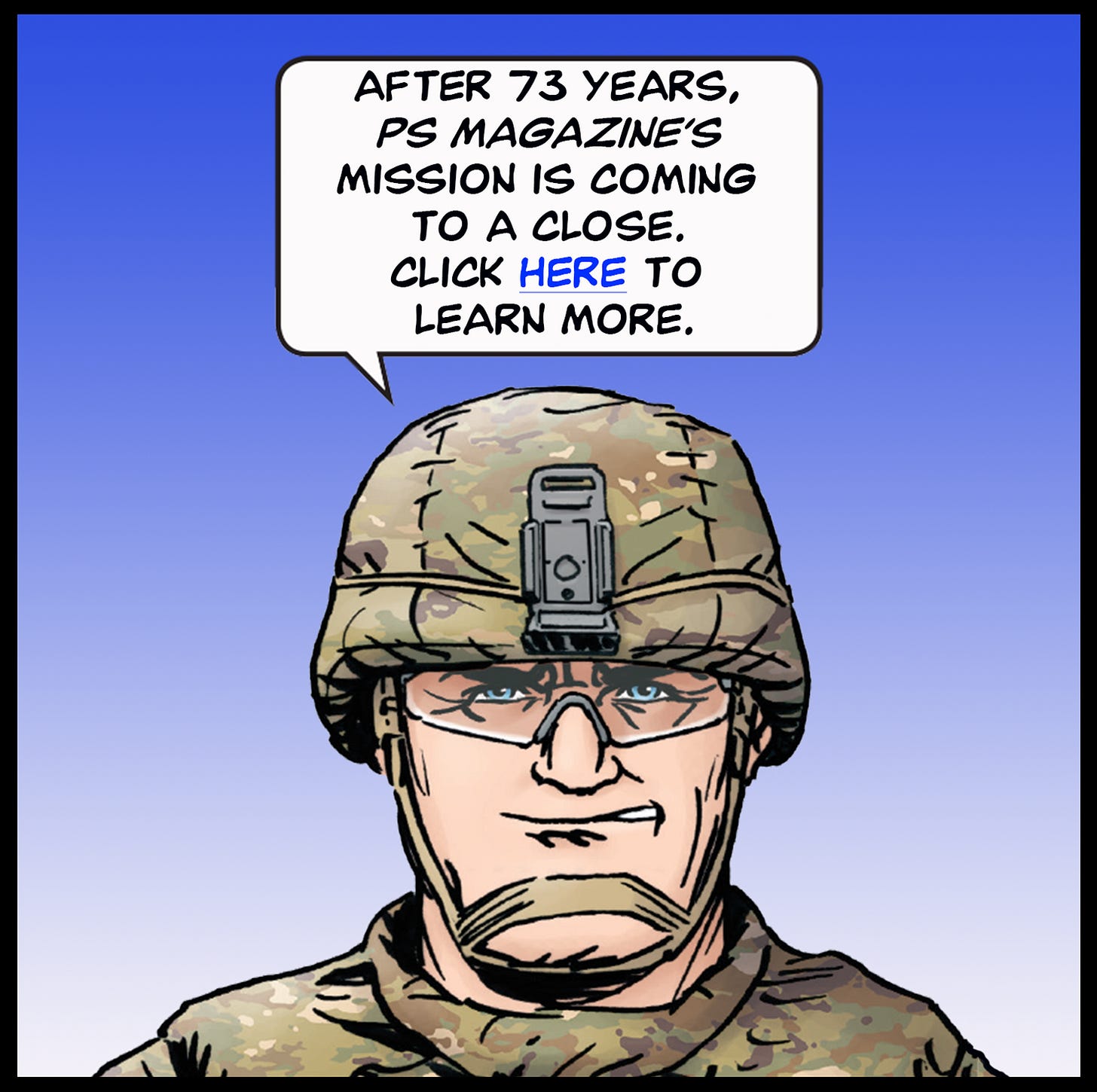Goodbye PS Magazine
The Army’s Army’s Preventive Maintenance Magazine, known as PS Magazine, is shutting down this fall. Due to budget cuts, the magazine that had scaled down over the last several years will shutter. PS’ great strength was in making maintenance accessible to every Soldier in the Army.
The magazine was a cornerstone resource for those of us at the tactical level. Whether you are a maintainer yourself, an executive officer focused on maintenance, or just somebody in search of a serial number for a niche replacement part, PS was there. Founded in 1951 to build on the success of Army Motors during World War II, personnel of all ranks and components not only read the magazine, but were also sent in inquiries and engaging with PS. Not only did that individual access the information, but they then shared the information with others, and brought more people to the website. Further, every Soldier benefitted from the magazine’s influence by having improved equipment. The magazine even recognized individuals who either maintained their own equipment well or helped fix others’ equipment. PS improved the Army.
Even more than that, PS Magazine provided content that was not only oriented, but also formatted for their reader-population, and had been well read. When talking to a current battery commander on the budget-cut-driven-decision, he commented that “using comics as an accessible medium to communicate best practices seems like a worthwhile investment.” He mentioned that not only had his unit benefited from the accessibility of the information, but even argued that the magazine’s formatting—whether short articles or comics—is a model the Army should use for other topics ranging from Army Regulations to tactics. “I’d even go further,” he said, “The concept needs to be expanded. We need entire portions of technical manuals, how-to operator guides, and maintenance steps in accessible forms.”
So, not only do we still need this resource as a pacesetter in both the maintenance and writing communities, but we need it to modernize. Today’s PS could be even more interactive, accessible, and searchable, perhaps even evolving from comics to Reels or other short video. With such a high operational tempo and a recruiting crisis, maintaining ready formations will only become increasingly more difficult. We need all the help we can get, and PS Magazine’s multitude of resources are a proven asset.
In order to not lose the wealth of information that has been published over 80 years, the Army should take care to organize PS’ archives. The closure announcement mentioned that “efforts are being made to ensure the website remains available for reference for up to three years past end-of-mission. Once this website is fully retired, readers can continue to access the PS Magazine archive on the publicly available Radio Nerds website.” But this is hardy ideal. Radio Nerds is not very searchable and, as a private website, could shutdown itself.
There is still value in retaining the PS archives. While some of the information from the magazine is no longer relevant due to phased out equipment or maintenance techniques, other articles are as relevant today as they were 60 years ago. For example, an article on firing artillery in cold weather from 1957 has many similar tips to one published in 2023. Casting aside more than 70 years of maintenance focused content seems shortsighted.
Fortunately, on the maintenance modernization side, some of this is already in the works. The Army Software Factory is fielding an app to support maintenance. However, this new app could merge an easily searchable archive of the magazine and the resources on the PS Magazine website to put the information at a Soldier’s fingertips.
PS Magazine’s model of Soldier-centric communication was a prime example of how to make a useful resource that improves the profession through writing, and we cannot let that example perish with this publication.
Zachery Bilskie is a logistics officer who is currently in company command in the 11th Airborne Division. He was previously in the 82nd Airborne Division and is originally from Evansville, IN.
Rebecca Segal is a field artillery officer, a graduate of Amherst College, a Massachusetts native, and a member of the Harding Project team.






Old Platoon Sergeant to new Platoon Leader (me): "Oh, one last thing sir," handing me a brand new issue of PS Magazine, "this is the Army's version of Playboy. Never leave home without it." And I didn't for the next three decades. Along with pictures and guidance of how to fix anything, articles covered a myriad of things that needed TLC at almost all levels of command - supply, property books, security, safety (oh the safety stuff!), et al. "Never leave home without" is sound guidance and hopefully someone in charge of appropriate "money bag" understands the wisdom in that guidance. "Special tools anyone? Especially those that come in handy in field expedients?"
Bring back original Connie.